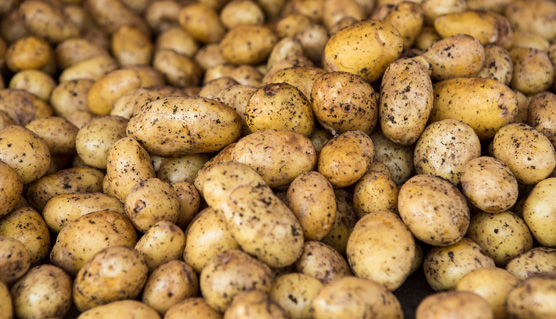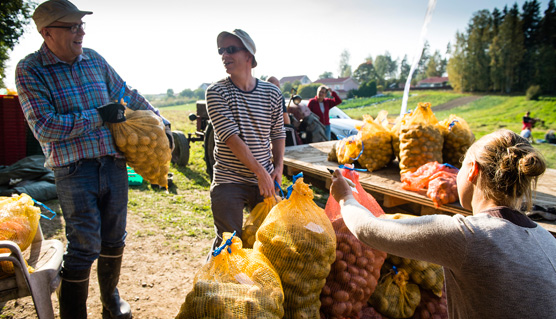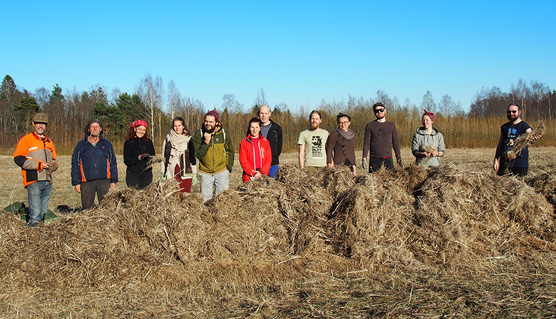
© Kai Widell
The Just food project researches and tests different models of Community Supported Agriculture together with two cooperatives. They are the Urban Cooperative FarmFood coop in the Helsinki region and JuurikasJKL in Jyväskylä.
In Community Supported Agriculture (CSA), consumers and producers share the risk of the crop season together. The consumer members pay a pre-agreed price for the upcoming season’s products which are then available throughout the season. Often, the members also take part in working on the jointly farmed field.
The Urban Cooperative FarmFood coop is the first CSA farm in Finland, run by the Herttoniemi food cooperative. Launched approximately ten years ago, the activity was not built onto an already functioning farm; the cooperative leased a field and hired a gardener to take care of the farming. In JuurikasJKL, the operators, i.e. the consumer members take also care of the production.
All elements of sustainability
Interest in Community Supported Agriculture has recently experienced a new surge. This has been noted by Olli Repo, one of the founding members of the Urban Cooperative FarmFood coop community, who describes the current time as the second wave of CSA. Sustainability issues and climate change are a wake-up call to thinking about new ways of producing and consuming food.
The profitability problems of agriculture have also made producers interested in different food distribution models, Repo continues. Alternative supply chains, in which the power of major trade chains is distributed to smaller operators, increase producers’ self-determination, and thereby improve their possibilities of improving profitability.
The ongoing coronavirus crisis has not by any means reduced consumers’ interest in the availability of food and sustainability of its production. “Local farming would be one answer to the challenges brought about by the virus in the uncertain global situation”, says Vesa Kaakkuriniemi of JuurikasJKL.
CSA membership creates a bond with soil and food production in a completely new way. According to both Repo and Kaakkuriniemi, awareness of food and its origin has increased among the members. Thereby, appreciation and respect for food increase.

The Urban Cooperative FarmFood coop in the Helsinki region. © Veikko Somerpuro
Financial fairness
In current CSA models, the annual crop share fee is the same for everyone, regardless of the situation and earnings of the members. “A one-time investment of hundreds of euros in products received over the coming months can, however, be financially impossible to many”, Repo says.
What if each member could choose an amount that best suits them? This kind of a new purchasing model would increase financial fairness and open up opportunities to people of different socioeconomic standings.
“The question is whether food could be priced differently for different income groups”, Repo considers.
What will be done in practice?
The new payment model is developed in cooperation with the Just food project. The idea is that each member can specify a suitable price for the crop shares of the upcoming crop season that they deem fair to themselves. This way, some members’ higher fee would make it possible to reduce the fees of other members. It is possible that reaching an outcome that covers the production costs requires several negotiation rounds among the members.
The functionality of the new approach is at the core of research; what are the benefits and problems emerging; and would the benefits and drawbacks accrue to a particular part of the members, says Riikka Aro, Postdoctoral Researcher at the University of Jyväskylä.
According to Olli Repo of the Urban Cooperative FarmFood coop, it is important in general to introduce the new approach to people. It is possible that it will lead to other applicable solutions for supporting socially and economically more equal CSA. Both Repo and Kaakkuriniemi would like to see more mixing between different population groups around fields and their products.
The researchers collect information about fee distribution models used around the world and coordinate the development of the model in workshops with the members of the Urban Cooperative FarmFood coop.

© JuurikasJKL
With JuurikasJKL, the co-creation efforts focus more broadly on the activities of the entire group and take shape together with the members. “The underlying idea is to take CSA as an example of an alternative food system and review its fairness”, Aro says. The research was started by interviewing the members about their ideas for developing the operations.
Vesa Kaakkuriniemi considers it a good thing that the research project will give a new boost for operations. He eagerly looks forward to the comparison of best practices in and outside Finland. The aim is to make people aware of the opportunities of CSA and expand operations.
“Perhaps this will wake up city dwellers to see this activity as a genuine alternative and impact opportunity”, he envisions. “Engagement is a considerably more important factor than money; the community can develop it by making access to the field easier with car sharing and rewarding major involvement with larger crop shares, for example.”
More information
- Olli Repo, the Urban Cooperative FarmFood coop, olirepo@gmail.com, tel. +358 50 571 5032
- Vesa Kaakkuriniemi, JuurikasJKL, pubushui@gmail.com, tel. +358 40 525 4841
- Postdoctoral Researcher Riikka Aro, University of Jyväskylä, firstname.lastname@jyu.fi, tel. +358 40 724 2112